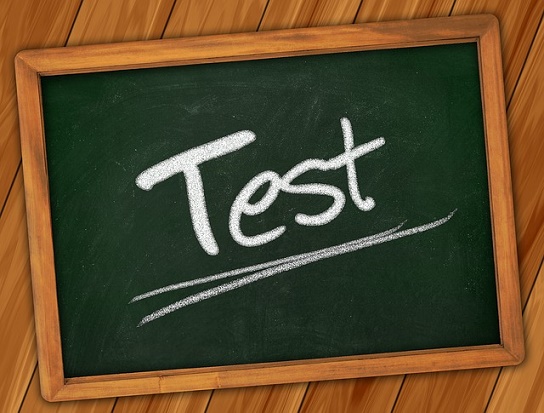
Have you taken the GRE, either the real version or a practice test, and didn’t get the score you were hoping for? Are you wondering if it’s possible to improve your GRE score?
In this guide, I’ll explain how much you can reasonably expect to raise your GRE score, how much studying it will take, and what tips you can use to help you meet your score goals.
Can You Make Big Improvements on the GRE?
First, is it really possible to improve your GRE score? Absolutely! Even though the GRE tests knowledge you’ve learned from over a decade of school, you still can make significant improvements to your GRE score.
The key is understanding which mistakes you made and learning how to avoid them in the future. You can do this by carefully reviewing the questions you answered incorrectly, shoring up your knowledge in any areas you’re not an expert in, and understand the types of questions the GRE frequently asks.
I’ll explain how to accomplish each of those things later on in this guide, but first, let’s discuss how long you can expect to study.
How Much Can You Improve Your GRE Score?
The biggest determiner of how much you can improve your GRE score is how much time you study. Below are very rough estimates of approximately how many hours you need to study in order to raise your score by a certain number of points.
Quick side note: we've created the world's leading online GRE prep program that adapts to you and your strengths and weaknesses. Not sure what to study? Confused by how to improve your score? We give you minute by minute guide.
You don't NEED a prep program to get a great GRE score. But we believe PrepScholar is the best GRE prep program available right now, especially if you find it hard to organize your study schedule and don't know what to study.
Click here to learn how you can improve your GRE score by 7 points, guaranteed.
These numbers indicate how much you need to study to raise your GRE score by that many points across BOTH sections. So, in 40 hours, you could raise your score by either 2.5 points on each section or 5 points on one (or any other combination that adds up to 5 points total).
- 5 points, 40 hours
- 10 points, 80 hours
- 20 points, 160 hours
- 30 points, 240 hours
These numbers are based on our studies of GRE students and their potential for improvement. Keep in mind that a 30 point improvement is huge – on the Verbal section, it can take you from the 47th percentile (150 score on Verbal) to the 95th percentile (165 score on Verbal).
However, these guidelines are very rough, as we’ll discuss next.
3 Factors That Can Affect These Numbers
The above numbers are VERY rough estimates of how much you’ll need to study to improve a certain amount. There are several factors that can increase or decrease this time.
#1: How Long You’ve Already Studied
If you’ve already done a lot of studying, you may need to add more time to the above averages since it will likely take you longer to make significant score improvements. The first few hours you spend studying are always the most effective since you’ll be able to get all the low-hanging fruit: fixing careless mistakes you made, remembering a math formula correctly, learning a common grammar rule, etc.
After you’ve learned the most obvious things that were keeping your score down, it will take longer to see similar improvements since you’ll likely have to do more in-depth studying and work harder to strengthen the areas you need to improve on.
On the other hand, if you took the GRE (practice or real thing) without much or any studying, you may be able to make the above improvements in less time.
#2: How Quickly You Learn New Material
You should also take into consideration how long, on average, it takes you to learn new material. If you’re someone who needs to go over things a few times for it to really sink it, it could take you longer to see real improvements on your GRE scores.
However, if you’re one of those lucky people who often retain information after they see it once, you may be able to see score improvements faster.
#3: How Effective Your Study Methods Are
How you study will also affect how quickly and how much you raise your GRE scores. If your prep includes studying that targets and corrects your weaknesses, then that will get you the improvements you want to see much faster than a more passive study method, such as just reading through old school notes. I’ll go over some tips to improve your study methods in the following section.
What If You Want to Raise Your GRE Score More Than 30 Points?
Is it possible to make very large improvements in your GRE score, such as more than 30 points? It’s definitely possible, but be aware that it’s also quite rare and will take a significant amount of time.
Making such a large improvement, unless you made a ton of careless errors or read the directions wrong for entire sections, will require you to make significant changes to the way you prepare for and take the GRE.
If you’re looking for this kind of big improvement, it may help to hire a tutor. Your tutor can help you understand what you did wrong and help you develop and stick to a tailored plan for avoiding those mistakes on future exams.

3 Tips for Maximizing Your GRE Score Improvement
There are certain things you can do while preparing for the GRE that will increase your chances of improving your scores. Three of the most important tips are explained below.
Create a Study Schedule
Once you figure out how much you’ll need to study for the GRE, you should develop a study schedule so you know when you’re supposed to be studying and can keep yourself on track.
Setting aside a regular time to study each day or week, such as weekdays from 8:00-9:30 or Sundays from 12:00-4:00, will make it easier to study because you’ll know ahead of time when you should be studying and can fit the rest of your schedule around it.
You should also include regular goals in your study schedule that you hope to meet, such as, “I want to understand Sentence Equivalence questions by the end of the weekend,” or “I want to have raised my Quantitative score five points by the end of the month.” Setting these goals can help encourage you to study and ensure you are on track to meet your goal scores.
Pinpoint Where You Made Mistakes
One of the best ways to increase the effectiveness of your studying is to accurately pinpoint where you need to make the most improvements, and then focus your studying on those areas.
Go through the GRE you took, and look at every question you answered incorrectly. Do you see any patterns? Did you do well in Verbal Reasoning but didn’t score as high for Quantitative Reasoning? Then look more specifically. Which Quantitative Reasoning questions did you struggle the most on? Algebra questions? Geometry questions? Those that included graphs or charts?
Once you’ve figured out where your weaknesses are, target those areas with your studying. This will help you focus your studying on the topics you need to improve the most in, and thus, can get you the biggest increases in score.
Take Practice Exams to Track Your Progress
You should also be taking regular practice GREs to monitor your progress and ensure you’re still on track to meet your goal scores.
During your studying, try to fit in at least 2-3 practice GREs, spread out regularly, so you can see where you’ve made improvements and what you still need to work on. Remember to keep pinpointing your mistakes so you can focus your studying on the areas where you most need it. You can download software with two official practice tests, and GRE prep books usually include a few unofficial practice GREs as well.

Want to improve your GRE score by 7 points? We have the industry's leading GRE prep program. Built by world-class instructors with 99th percentile GRE scores, the program learns your strengths and weaknesses through machine learning data science, then customizes your prep program to you so you get the most effective prep possible.
Try our 5-day full access trial for free:
Conclusion: How Much Can You Improve Your GRE Score?
Since the GRE tests skills that often take years to develop, it may seem like your original GRE score is set in stone. Not so! With enough time and a good study plan, you can significantly improve your GRE score.
The amount you can increase your scores will depend most on how many hours you can devote to studying. Other factors include how much you’ve already studied, how fast a learner you are, and how effective your study methods are.
To make your GRE studying most effective, be sure to create a study schedule, pinpoint where you made mistakes, and take regular practice tests to track your progress and make sure you’re where you want to be.
What’s Next?
When should you take the GRE? Check out our guide to learn exactly when you should take the GRE in order to get your best score!
What are the best GRE books to help you prepare for the exam? Check out our list and find the best GRE prep book for you!
How long should you study for the GRE? Learn how many hours you need to study for the exam as well as how to set up a study schedule and track your progress.
Ready to improve your GRE score by 7 points?
We've written a eBook about the top 5 strategies you must be using to have a shot at improving your GRE score.
Download it for free now:

